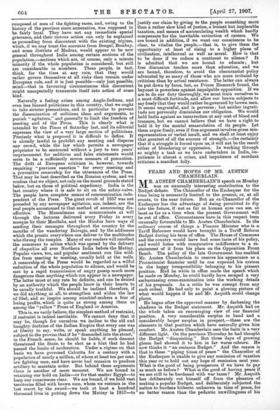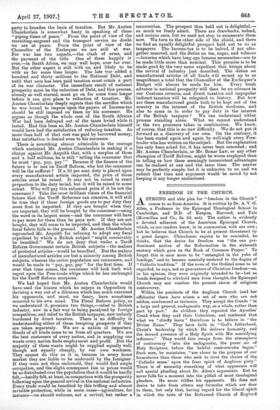FEARS AND HOPES OF MR. AUSTEN CHAMBERLAIN.
MR. AUSTEN CHAMBERLAIN'S speech on Monday was an unusually interesting contribution to the Budget debate. The Chancellor of the Exchequer for the time being is necessarily limited to the present, or, at all events, to the near future. But an ex-Chancellor of the Exchequer has the advantage of being permitted to dip into the future, if .not as far as human eyes can see, at least as far as a time when the present Government will be out of office. Circumstances have in this respect been unusually favourable to Mr. Austen Chamberlain. In the ordinary course of things a Finance Minister who is •a Tariff Reformer would have brought in a Tariff Reform Budget during his term of office. The House of Commons and the country would have had some taste of his policy, and would listen with comparative indifference to a re- statement of it from his place on the Opposition Front Bench. The policy of the late Government has enabled Mr. Austen Chamberlain to reserve his appearance as a Protectionist financier until he can expound his system in the happy irresponsibility belonging to his present position. Had he while in office made the speech which he made on Monday, he could hardly have escaped a very embarrassing cross-examination into the working details of his proposals. As a critic he was exempt from any such ordeal. He had only to paint a glowing picture of what would happen if he and Mr. Asquith could change places. He began after the approved manner by darkening tho shadows in the Budget statement. Mr. Asquith had on the whole taken an encouraging view of our financial position. A very considerable surplus in- hand and a considerably larger surplus in prospect,—these are the elements in that position which have naturally given him comfort. Mr. Austen Chamberlain sees the facts in a very different light. On the previous Thursday he had thought the Budget "disquieting." But three days of growing gloom had showed it to him in far worse colours. He now thinks it "an ominous Budget." And the reason is that in these "piping times of peace" the Chancellor of the Exchequer is unable to give any remission of taxation this year or to hold out any hope of remission next year. What is the good of being prosperous if we have to, pay as much as before ? What is the good of having, peace if we are still to be burdened with war taxes ? Mr. Asquith has deliberately cut himself off from the pleasure of- making a popular Budget, and deliberately subjected the nation to burdens hitherto unknown in time of peace, .for no better reason than the pedantic unwillingness of his party to broaden the basis of taxation. But. Mr. Austen Chamberlain is somewhat hasty in speaking of these "piping times of peace." From the point of view of the recruiting-sergeant and the transport service no doubt we are at peace. From the point of view of the Chancellor of the Exchequer we are still ' at war. For war has two aspects,—the clash of arms, and the payment of the bills. One of them happily is over,—in South Africa, we may well hope, over for ever. But the other aspect is still with us, and likely to be with us for some time longer. The late war added a hundred and thirty millions to the National Debt, and until that sum has been paid taxation must retain a part of its war character. The immediate result of national prosperity must be the reduction of Debt, and this process, already so well started, must go on for some time longer before it can give place to reduction of. taxation. Mr. Austen Chamberlain deeply regrets that the sacrifice which he was bound to impose upon the payers of Income-tax should be still imposed on them by his successor. He argues as though the whole cost of the South African War had been defrayed out of the taxes levied while it lasted. Had this been so, Mr. Austen Chamberlain himself would have had the satisfaction of reducing taxation. As more than half of that cost was paid by borrowed money, that satisfaction is denied even to his successor.
There is something almost admirable in the courage which sustained Mr. Austen Chamberlain in making it a charge against Mr. Asquith that, with a surplus of three and a half millions, he is still " telling the consumer that he must pay, pay, pay.' " Because if the finance of the future is to rest on Tariff Reform, who but the consumer will be the sufferer ? If a 10 per cent. duty is placed upon every manufactured article imported, the price of those articles must be raised. It may not be raised in exact proportion to the duty levied, but it will be raised to some extent. Who will pay this enhanced price if it he not the consumer ? Take the most brilliant vision of the financial future that the Tariff Reformer can conceive, it will still be true that if these foreign goods are to pay duty they must first bo imported. If they are bought when they are imported, they will be bought by the consumer—using the word in its largest sense—and the consumer will have to pay more fur them than he pays now. If they are not bought, they will cease to be imported, and then the whole fiscal fabric falls to the ground. Mr. Austen Chamberlain reproached Mr. Asquith for refusing to adopt any fiscal expedient by which a British subject "might conceivably be benefited." We do not deny that under a Tariff Reform Government certain British subjects—the makers of protected articles—would be benefited. But the makers of manufactured articles are but a minority among British subjects, whereas the entire population ate consumers, and would be made to " pay, pay, pay " for the first time. If ever that time comes, the consumer will look back with regret upon the Free-trade whips which he has exchanged for the Tariff Reform scorpions.
We had hoped that Mr. Austen Chamberlain would have used the leisure which he enjoys in Opposition in devising a way out of a dilemma which has much exercised his opponents, and must, we fancy, have sometimes occurred to his own mind. The Fiscal Reform policy, as we understand it, promises two things,—relief to British industry, now in a fair way to being paralysed by foreign competition, and relief to the British taxpayer, now unfairly burdened by direct taxation. There is no difficulty in understanding either of these tempting prospects if they are taken separately. We are a nation of importers. Goods of all kinds come to us from all quarters. We are the beat customers of every nation, and in supplying our wants every nation finds employment and profit. But the majority of these wants might be supplied equally well, though not equally cheaply, by our own workmen. They cannot do this as it is, because in every home market they are liable to be undersold by the foreigner. If they were not thus undersold, they would find ample occupation, and the slight consequent rise in prices would be so distributed over the population that it would be hardly felt,—hardly felt, at least, in comparison with the prosperity following upon the general revival in the national industries. Every trade would be benefited by this trifling and almost invisible protection, while in some cases—agriculture, for instance—we should welcome, not a revival, but rather a resurrection. The prospect thus held out is delightful,— so much we freely admit. There are drawbacks, indeed, and serious ones, but we need not stop to enumerate them now. We turn to the other side of the shield, and there we find an equally delightful prospect held out to us as taxpayers. The Income-tax is to be halved, if not alto- gether removed, and the duties on tea, sugar, and tobacco —luxuries which have long ago become necessaries—are t6 be made little more than nominal. This promise is to be made good by the very same expedient that brings about the revival of industry just described. The duties on manufactured articles of all hinds will mount up to so magnificent a total that the Chancellor of the Exchequer's Budget will almost be made for him. Every fresh advance in national prosperity will then be an advance in our Customs revenue, and direct taxation and unpopular indirect taxation will be relegated to history. But how are these manufactured goods both to be kept out of the country in the interest of the British workman, and also to come in iu order to pay duty in the interest of the. British taxpayer ? We can understand either process standing alone. What we cannot understand is the two processes taken in combination. We know, of course, that this is no new difficulty. We do not put it forward as a discovery of our own. On the contrary, it has been stated again and again by well•nigh every Free- trader who has written on the subject. But the explanation has only been asked for, it has never been conceded ; and Mr. Austen Chamberlain, or Mr. Bonar Law, or any other champion of Tariff Reform, might be worse employed than in telling us how these seemingly inconsistent advantages can be realised at one and the same time. The answer may be perfectly simple, but it is unknown to us. and we submit that time and argument would be saved by not keeping it any longer undisclosed.



























































 Previous page
Previous page